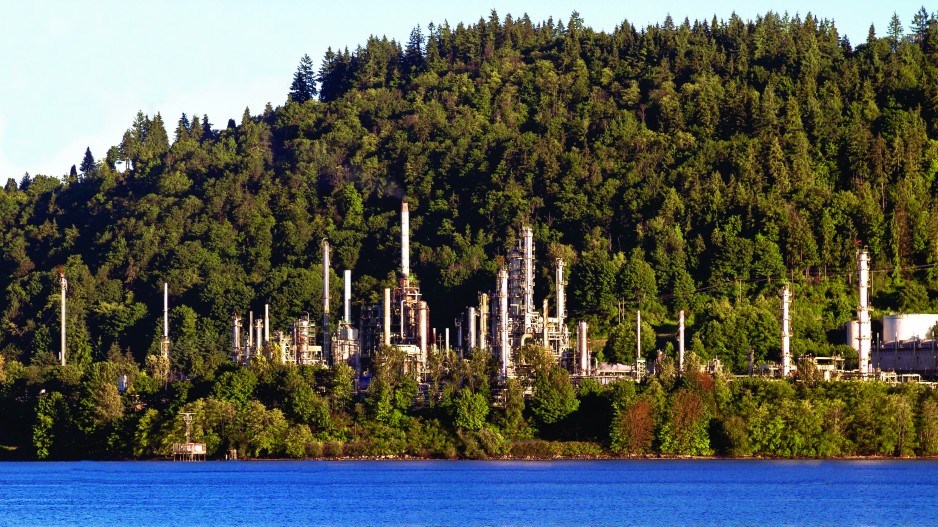(Editor's note: This story has been corrected. The original stated that half of the Trans Mountain pipeline's capacity is used to transport diluted bitumen.)
Lower Mainland drivers are getting a taste of what it might be like if Alberta ever decided to play hardball in its pipeline war with B.C. and cut off the flow of oil to B.C.
Gas prices spiked in the Lower Mainland recently, due in no small part to a planned shutdown of the Parkland Fuel Corp. (TSX:PKI) refinery (formerly owned by Chevron) in Burnaby.
“One of the reasons you’re paying $1.48 per litre has everything to do with the fact that Parkland’s closed down right now,” said Dan McTeague, a former Liberal MP and now senior petroleum analyst for GasBuddy.
The planned shutdown started about three weeks ago and was expected to last to the beginning of March, McTeague said.
While the refinery is not producing any gasoline, diesel or jet fuel, refined fuels from Alberta can still flow along the Trans Mountain, which is one of the few dual-purpose pipelines that can accommodate both oil and refined fuels.
About half of the pipeline’s capacity of 300,000 barrels per day is used to transport crude oil from Alberta to supply refineries in Washington State. Roughly 9% of the piepline's capacity is used to transport diluted bitumen products for export.About 4% of the pipeline capacity is used to transport refined fuels from Alberta refineries to a terminal in Kamloops.
In total, the Trans Mountain pipeline supplies about 70% of the Lower Mainland’s gasoline and diesel, McTeague said, either through the Parkland refinery or refineries in Alberta. Some fuels come in by barge from refineries in Washington state.
When a refinery shuts down for planned maintenance, arrangements are made with other refineries to make up for the temporary supply shortage.
It would be a whole other story if a bellicose government in Alberta, under either Premier Rachel Notley or would-be premier Jason Kenney, tried to halt the flow of oil to B.C.
Kenney has suggested that could happen if he were elected premier of Alberta.
“One of the things we could consider, if British Columbia really gets in the way of Canadian free trade and Canada’s prosperity, would be restricting the shipment of oil to Burnaby as it is,” he said.
If Kenney or Notley were to attempt such a drastic measure, it would be painful all around, for Alberta oil companies and British Columbian citizens and businesses alike.
“B.C. drivers would be absolutely crippled if this were to take place,” McTeague said. “You’d lose 80% of your supply. Getting gasoline would be virtually impossible, and diesel as well.
“You can see what a temporary shutdown does. It causes a six-cent disruption, and that’s on the clear assumption that there’s plenty of time to ramp up and create alternatives.”
There is some precedent for Alberta using oil as political leverage. In 1980, Albertans were so enraged by the Pierre Elliott Trudeau government’s national energy program that then-premier Peter Lougheed tried to throttle oil production in Alberta, in an attempt to punish Eastern Canada.
Notley has not suggested anything so drastic.
However, she has cancelled talks between B.C. and Alberta on buying B.C. power, and she has said her government is considering other legal and economic measures.
And Kenney has threatened that if the dispute is not resolved by the next Alberta election and the United Conservative Party forms the next government in Alberta, he might turn off the taps.
It’s not clear how he would do that, since Alberta has no more jurisdiction in the matter – pipelines come under federal purview – than British Columbia does. But he could try.
Finding an alternative supply of crude oil isn’t as simple as it might sound. Refineries are designed to refine particular kinds of oil, so a refinery that is set up to refine Alberta dilbit can’t simply flip a switch and start refining Texas light oil.
Trevor Tombe, associate professor in the University of Calgary’s economics department, characterizes Kenney’s talk of cutting off B.C.’s oil as pre-election bluster that will never come to pass.
He said Ottawa would defuse the situation by stepping in and declaring the B.C. government restrictions constitutionally invalid.
“For the feds here it’s very easy,” Tombe said. “They can just declare that these rules that B.C. is planning to bring out are just in no way applicable to the pipeline, and that it would be up to B.C. to challenge the feds in the courts.
“B.C. doesn’t have a legal leg to stand on, and so put the legal ball in B.C.’s court and require that they challenge the feds, but have the feds’ action stand in the meantime, is the way to go.”
See related story on trade war between B.C. and Alberta.




